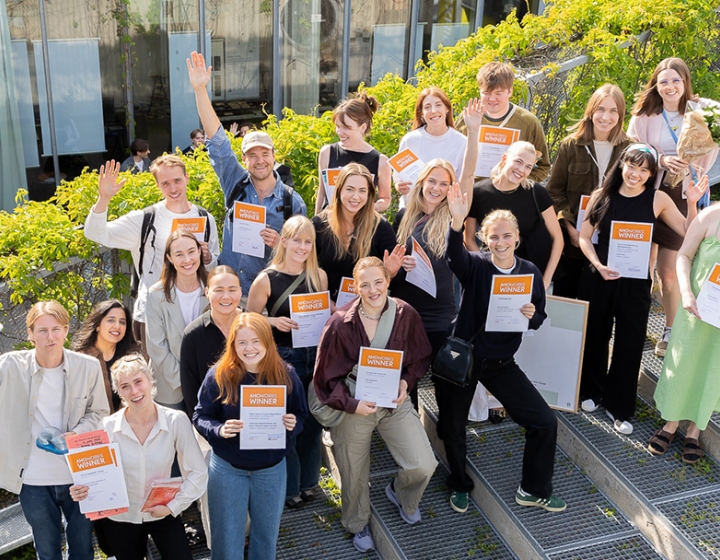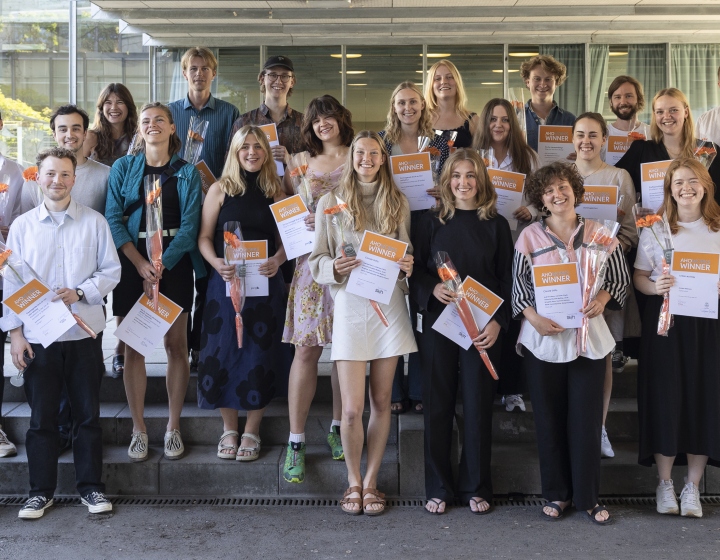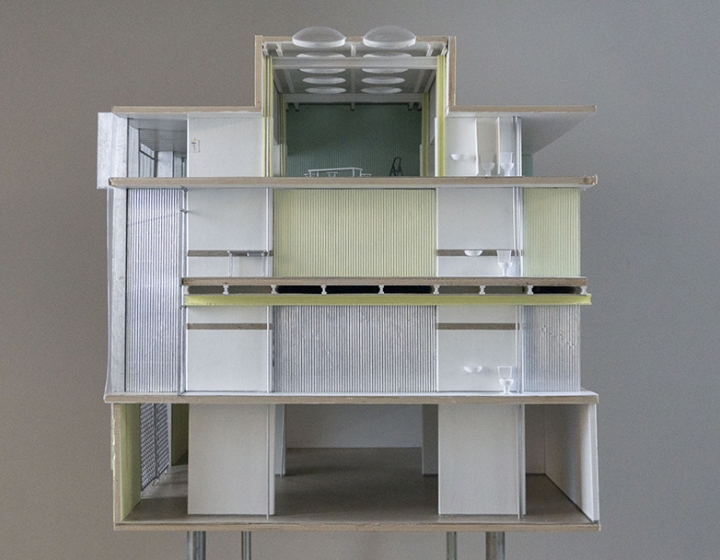Edwin Oyaro Ondieki, new PhD
Tuesday, June 7th. Edwin Oyaro Ondieki defended his PhD thesis Tenement Housing in Nairobi. The Case of Lucky Summer (Pipeline) Settlement-Embakasi.
Why did you choose this theme for your dissertation?
Tenement housing is a relatively new phenomenon in Kenya, which is quickly gaining popularity.These are high-rise buildings where tenants live in one or two rooms and share toilet facilities. The trend started in the late 1970s, but the magnitude of development picked up rapidly in the 2000s.
The thesis is a study of this trend. Though often build on legally owned land, this kind of housing is unregulated. The houses are not built in accordance with planning regulations and generally are substandard in terms of construction. Indeed just a month ago, one tenement collapsed and killed 51 people in Nairobi. While looking at the quality of this type of housing, I also studied how people live. Quality and construction, domestic life, poverty, land ownership, design and urban planning are some of the issues that face this type of housing.
Although the tenements have a number of issues, the residents, who are the upper level of low-income category, perceive them as superior to the slums. However, they are possibly worse!
The tenements are misconceived as a step up from the slums. In what way?
The density of the buildings and the number of tenants that occupy the space is different from the slums: A tenement building stacks its inhabitants vertically – slums spread out horizontally. This leaves more space for people. Therefore, in terms of physiological comfort, the tenements are more disadvantaged. Privacy is difficult. Life in tenements kills the social fabric in a way. In the slums – because of their expansive nature - people can run a business and they have social networks.
What is your approach to this complex issue?
I conducted a multidisciplinary approach in the data collection that includes historical reviews of material, household surveys, observations, interviews and measurements of building parameters. I have chosen to highlight the many factors through the example of the Lucky Summer settlement in Embakasi, Nairobi, where the main participants were tenants, landlords, contractors and caretakers.
What did you find?
Lucky Summer houses younger families who work nearby or in the vicinity. The Lucky Summer tenements have developed from 1997 onwards. It is a new settlement in Nairobi terms, and it is a little unique too. Whereas other settlements were developed as site-and-service schemes with infrastructure such as roads, water and sewer, Lucky Summer has been developed purely by the tenement investors. Thus, Lucky Summer was constructed with no sewer or roads, but later on they put up these systems which are however inefficient.
You spent six months with the tenants to observe and partake. Could you describe life in Lucky Summer?
The rooms are very small, around10 m2. This accommodates an entire family. The average room holds 2.5 people. This is a very low number compared to the slums, where you will find 3 – 4 per unit. Within the unit, there is very tight space. In this space everything must be organized; cooking, entertaining and sleeping.
The rooms might look efficient for a single person, but are very tight for a family. The bathrooms are shared. Two toilets, eastern style, and one shower to 12 to 14 households. The tenements are 8 floor rises. Walk ups. No flowing water in neither bathroom nor toilet. The water has to be carried up. The water quality is not guaranteed.
What characterizes daily life in Lucky Summer?
The room is reorganized during the day when it is used as a living space. When it is time to cook, the room is shifted to create a cooking space. At night, the kitchen is moved to create sleeping space. The couple on the bed, the children on a mat with a mattress. In a single room, everybody goes to bed at the same time, waking up the same manner.
Domestic life is organized and creative. The tenants are conscious of what they cook, how they use energy. They buy semi-cooked food sold outside the buildings and complete cooking in the house. In a single room heating, evaporation and the time spent in the cooking area is minimized. They buy pre-prepared vegetables, and use resources in an efficient way. All utensils are used with efficiency. The tenants use little money. Scarce resources make them very resourceful and innovative.
Privacy and family life are a great concern. It is completely un-African to live like this. I am not saying it is European – but sharing one room – living in this rigid tight space is far from traditional. Just imagine changing clothes: You have to make people leave the house to do so. Children are not brought up in a traditional sense. This has consequences for the nation. The value systems are put under great pressure. With increasing urbanization there will be a lot more of these problems. Norms change.
In what way?
Respect, exposure to sex, exposure to abuse, and exposure to criminal activity practices, to prostitution, drugs. The facilities are not suited for children. There are no common amenities. No schools. The schools here are set up by private people and not up to standards. There are no playgrounds. And, there is no space for children. They must play on the balconies and in the corridors. They cannot play like children, and use their energy. This housing should not be allowed to accommodate children.
Now the big question: what to do about these tenements?
Housing is a political issue with economic parameters, social aspects, the physical environment and the solution is political. Poverty being one of the dominant factors at the center of the housing problem. The issue of tenement housing should be addressed on three main levels; the housing policy perspective, land administration and improvement measures within the existing settlements.
Housing policy
The first level should focus on policy and legislative issues such as reviewing the urban physiological planning policy. The problem must be redressed to recognize that high-density housing needs to conform to the social, economic and political realities of the urban context. One needs to recognize the changes this way of housing has brought about and that the trend will not decrease. Facilities must be provided in terms of planning, and one needs a social policy of housing.
The very poor people cannot afford housing. Vulnerable households need assistance. One should define the bare minimum for different categories of households, and look for a way of funding.
Land administration
The next level is land administration. People own land, the state owns very little. This is a fundamental issue. Access to land is a big problem, and a very political one. Are the landowners willing to sell? We need progressive land policies.
The land-owners in the cities are influential - how to address this?
I have talked to tenants, developers, contractors and managers. What came out is that tenement housing is an investment for some and for others it is like a pension-plan. Every Kenyan wants to build a tenement. It is a money machine, a cash-cow. To find a way around this we need to fix pensions, inflation, and schooling. The tenements provide a life-long economic plan, they put the children through school and provide for old age. Developing land into tenement gives the highest return on investment, so the sites are over-developed.
Improvement measures
The third level that must be addressed is to develop strategies to review existing housing The housing is already there – what do we do with it? Enforcement strategies must be developed by the government, to effect quality standards. In some cases, demolishment is necessary, and this is hard. Remodeling can be done when it is possible to make the tenement conform to certain standards: There has to be enough light and air. However, the ones that cannot be remodeled must be demolished. Further developments like these tenements must be stopped. New ones must have approval and we must deal with the history.
Tenement housing is a relatively new phenomenon in Kenya, which is quickly gaining popularity.These are high-rise buildings where tenants live in one or two rooms and share toilet facilities. The trend started in the late 1970s, but the magnitude of development picked up rapidly in the 2000s.
The thesis is a study of this trend. Though often build on legally owned land, this kind of housing is unregulated. The houses are not built in accordance with planning regulations and generally are substandard in terms of construction. Indeed just a month ago, one tenement collapsed and killed 51 people in Nairobi. While looking at the quality of this type of housing, I also studied how people live. Quality and construction, domestic life, poverty, land ownership, design and urban planning are some of the issues that face this type of housing.
Although the tenements have a number of issues, the residents, who are the upper level of low-income category, perceive them as superior to the slums. However, they are possibly worse!
The tenements are misconceived as a step up from the slums. In what way?
The density of the buildings and the number of tenants that occupy the space is different from the slums: A tenement building stacks its inhabitants vertically – slums spread out horizontally. This leaves more space for people. Therefore, in terms of physiological comfort, the tenements are more disadvantaged. Privacy is difficult. Life in tenements kills the social fabric in a way. In the slums – because of their expansive nature - people can run a business and they have social networks.
What is your approach to this complex issue?
I conducted a multidisciplinary approach in the data collection that includes historical reviews of material, household surveys, observations, interviews and measurements of building parameters. I have chosen to highlight the many factors through the example of the Lucky Summer settlement in Embakasi, Nairobi, where the main participants were tenants, landlords, contractors and caretakers.
What did you find?
Lucky Summer houses younger families who work nearby or in the vicinity. The Lucky Summer tenements have developed from 1997 onwards. It is a new settlement in Nairobi terms, and it is a little unique too. Whereas other settlements were developed as site-and-service schemes with infrastructure such as roads, water and sewer, Lucky Summer has been developed purely by the tenement investors. Thus, Lucky Summer was constructed with no sewer or roads, but later on they put up these systems which are however inefficient.
You spent six months with the tenants to observe and partake. Could you describe life in Lucky Summer?
The rooms are very small, around10 m2. This accommodates an entire family. The average room holds 2.5 people. This is a very low number compared to the slums, where you will find 3 – 4 per unit. Within the unit, there is very tight space. In this space everything must be organized; cooking, entertaining and sleeping.
The rooms might look efficient for a single person, but are very tight for a family. The bathrooms are shared. Two toilets, eastern style, and one shower to 12 to 14 households. The tenements are 8 floor rises. Walk ups. No flowing water in neither bathroom nor toilet. The water has to be carried up. The water quality is not guaranteed.
What characterizes daily life in Lucky Summer?
The room is reorganized during the day when it is used as a living space. When it is time to cook, the room is shifted to create a cooking space. At night, the kitchen is moved to create sleeping space. The couple on the bed, the children on a mat with a mattress. In a single room, everybody goes to bed at the same time, waking up the same manner.
Domestic life is organized and creative. The tenants are conscious of what they cook, how they use energy. They buy semi-cooked food sold outside the buildings and complete cooking in the house. In a single room heating, evaporation and the time spent in the cooking area is minimized. They buy pre-prepared vegetables, and use resources in an efficient way. All utensils are used with efficiency. The tenants use little money. Scarce resources make them very resourceful and innovative.
Privacy and family life are a great concern. It is completely un-African to live like this. I am not saying it is European – but sharing one room – living in this rigid tight space is far from traditional. Just imagine changing clothes: You have to make people leave the house to do so. Children are not brought up in a traditional sense. This has consequences for the nation. The value systems are put under great pressure. With increasing urbanization there will be a lot more of these problems. Norms change.
In what way?
Respect, exposure to sex, exposure to abuse, and exposure to criminal activity practices, to prostitution, drugs. The facilities are not suited for children. There are no common amenities. No schools. The schools here are set up by private people and not up to standards. There are no playgrounds. And, there is no space for children. They must play on the balconies and in the corridors. They cannot play like children, and use their energy. This housing should not be allowed to accommodate children.
Now the big question: what to do about these tenements?
Housing is a political issue with economic parameters, social aspects, the physical environment and the solution is political. Poverty being one of the dominant factors at the center of the housing problem. The issue of tenement housing should be addressed on three main levels; the housing policy perspective, land administration and improvement measures within the existing settlements.
Housing policy
The first level should focus on policy and legislative issues such as reviewing the urban physiological planning policy. The problem must be redressed to recognize that high-density housing needs to conform to the social, economic and political realities of the urban context. One needs to recognize the changes this way of housing has brought about and that the trend will not decrease. Facilities must be provided in terms of planning, and one needs a social policy of housing.
The very poor people cannot afford housing. Vulnerable households need assistance. One should define the bare minimum for different categories of households, and look for a way of funding.
Land administration
The next level is land administration. People own land, the state owns very little. This is a fundamental issue. Access to land is a big problem, and a very political one. Are the landowners willing to sell? We need progressive land policies.
The land-owners in the cities are influential - how to address this?
I have talked to tenants, developers, contractors and managers. What came out is that tenement housing is an investment for some and for others it is like a pension-plan. Every Kenyan wants to build a tenement. It is a money machine, a cash-cow. To find a way around this we need to fix pensions, inflation, and schooling. The tenements provide a life-long economic plan, they put the children through school and provide for old age. Developing land into tenement gives the highest return on investment, so the sites are over-developed.
Improvement measures
The third level that must be addressed is to develop strategies to review existing housing The housing is already there – what do we do with it? Enforcement strategies must be developed by the government, to effect quality standards. In some cases, demolishment is necessary, and this is hard. Remodeling can be done when it is possible to make the tenement conform to certain standards: There has to be enough light and air. However, the ones that cannot be remodeled must be demolished. Further developments like these tenements must be stopped. New ones must have approval and we must deal with the history.
Edwin Oyaro Ondieki is an architect and lecturer at the Department of Architecture and Building Science, the University of Nairobi, where he teaches building technology, housing and urban design. He previously worked in the civil service of the government of Kenya as architect and later as instructor at the Kenya Institute of Highways and Building Technology (KIHBT) between 1994 and 2003. He studied architecture at the University of Nairobi (1993) and the University of Auckland, New Zealand (1999).
Read more in his AHO phD thesis book "Tenement Housing in Nairobi" (ISBN 978-82-547-0295-6)
Supervisors:
Professor Karl Otto Ellefsen, AHO and Professor Tom Anyamba, University of Nairobi, have been his supervisors.
Adjudication Committee:
Professor Hans Skotte, First Opponent
Dr. Ezekiel Moshi, Second Opponent
Professor Christian Hermansen, Third Member and Coordinator
See also:
The Untenable Case of Lucky Summer, OCULS
Read more in his AHO phD thesis book "Tenement Housing in Nairobi" (ISBN 978-82-547-0295-6)
Supervisors:
Professor Karl Otto Ellefsen, AHO and Professor Tom Anyamba, University of Nairobi, have been his supervisors.
Adjudication Committee:
Professor Hans Skotte, First Opponent
Dr. Ezekiel Moshi, Second Opponent
Professor Christian Hermansen, Third Member and Coordinator
See also:
The Untenable Case of Lucky Summer, OCULS



